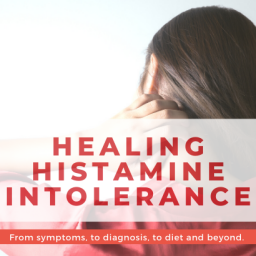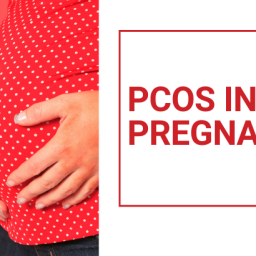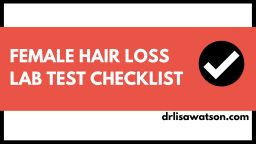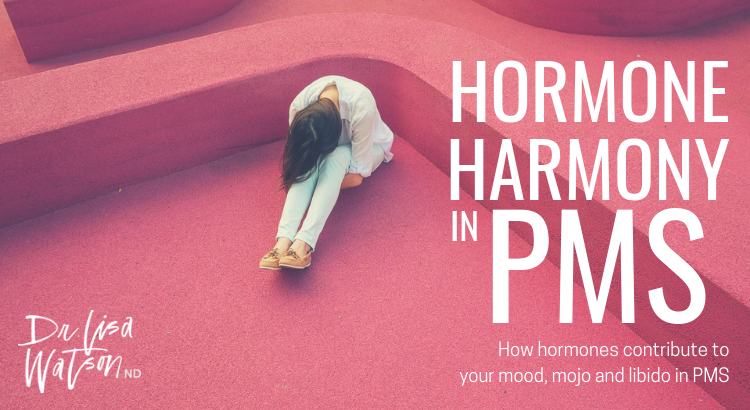
Welcome to the first installment of the “Hormone Harmony” series. In this series I’ll be exploring some of the most common states of female hormone imbalance, how your hormones can explain your symptoms, and some simple hormone hacks to help bring your body back into a state of hormone harmony.
Premenstrual Syndrome (PMS)
While a definition of PMS may not be necessary if you are reading this (it’s likely you’ve had first hand experience), I will try to give one that encompasses exactly what PMS is.
PMS is a recurrent set of physical and/or behavioural symptoms that occurs 7-14 days before a period and negatively impacts some aspect of a woman’s life
There have been over 150 (seriously!) symptoms of PMS identified. Some of the most common include:
 Low energy
Low energy- Mood changes – anger, crying, irritability, anxiety, depression, bitchiness
- Food cravings
- Headache
- Low sex drive
- Breast tenderness
- Digestive upset – constipation, bloating, diarrhea, gas
- Difficulty sleeping
Unfortunately we don’t really know what causes some women to experience PMS more than other women. But hormone imbalances are a common proposed cause, and in my practice I see balancing hormones as the most important means of decreasing symptoms of PMS.
Hormone Imbalances in PMS
The relationship between estrogen and progesterone is one of the most important hormone balances in a woman’s body. Imbalance in estrogen and progesterone levels is thought to be the primary cause of PMS.
Estrogen is produced throughout the month by the ovaries, adrenal glands and fat cells. It main action is growth – growth of breast tissue in puberty, and growth of the endometrial lining in the uterus during menstrual cycles.
Progesterone is produced during the second half of the menstrual cycle – after ovulation – by the ovaries. Progesterone helps to balance the effects of estrogen and prepare the uterus for a possible pregnancy.
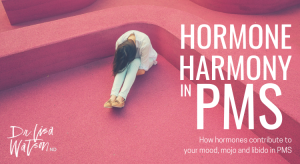 A too high estrogen level, or a too low progesterone level is thought to be the most likely cause of PMS symptoms in most women. This state, commonly called “estrogen dominance” is the most common hormone imbalance in women between the ages of 15 and 50. Estrogen dominance is becoming more common in North America due to increasing exposure to xenoestrogens (chemicals in our environment that mimic estrogen), high rates of obesity, decreased ability of our livers to detoxify and overwhelming amounts of stress.
A too high estrogen level, or a too low progesterone level is thought to be the most likely cause of PMS symptoms in most women. This state, commonly called “estrogen dominance” is the most common hormone imbalance in women between the ages of 15 and 50. Estrogen dominance is becoming more common in North America due to increasing exposure to xenoestrogens (chemicals in our environment that mimic estrogen), high rates of obesity, decreased ability of our livers to detoxify and overwhelming amounts of stress.
The important thing to remember with PMS and hormone balance is that it is the relationship and balance of estrogen and progesterone that leads to symptoms. You may have normal levels of estrogen, but if your progesterone is low you will still experience symptoms. Progesterone levels are low in women who do not ovulate, and in those with significant stress (your body will convert progesterone into cortisol, leaving you deficient in much-needed progesterone).
Hormone Hacks for PMS
If you are a woman experiencing PMS, taking charge of your hormones and getting them into balance can make a huge difference in your quality of life. Below are some simple Hormone Hacks to get you started.
-
Follow the PMS diet
There have been some significant findings in the diets of women who suffer from significant PMS. Compared to women who do not have PMS they eat 275% more sugar, 79% more dairy and 62% more refined carbohydrates. Avoiding these foods – and instead choosing fruits, vegetables, whole grains and healthy proteins – can diminish PMS symptoms significantly and promote healthy hormone balance.
-
Cut the caffeine
No one wants to hear it, but drinking caffeine-containing beverages increases the severity of PMS. And those effects are worsened if you add sugar to your tea or coffee. So cut back, or cut it out all together if you want to decrease your PMS.
-
Exercise
Women who exercise regularly have less PMS. Multiple studies have found this to be true, and the more frequently you exercise the better the boost. Exercise is known to decrease estrogen levels – so get out there and get moving.
-
Get your nutrients in
Deficiencies in many nutrients have been found in women with PMS. Some notable ones include magnesium, vitamin B6, and zinc. All of these nutrients can be found in nuts and seeds – also known to be excellent sources of vegan protein.
-
Get tested
 Understanding your hormone imbalances can be incredibly valuable to managing symptoms like PMS. Testing your hormone levels will give you a clear understanding of what is happening in your body during a specific phase of your menstrual period. For PMS we test hormone levels (estrogen, progesterone and prolactin) about 7 days before your expected period.
Understanding your hormone imbalances can be incredibly valuable to managing symptoms like PMS. Testing your hormone levels will give you a clear understanding of what is happening in your body during a specific phase of your menstrual period. For PMS we test hormone levels (estrogen, progesterone and prolactin) about 7 days before your expected period.
-
Herbal hormone balancers
There are some phenomenal hormone balancers in the world of herbal medicine. Vitex agnus-castus (also known as chaste berry) can improve progesterone levels, helping to balance estrogen dominance. Phytoestrogens, like those found in black cohosh, soy and flaxseeds, can also help to normalize estrogen levels by decreasing the action of our body’s own estrogen in favour of the milder estrogen signal from plant estrogens.
-
Bioidentical progesterone
When all else fails in hormone balancing for PMS, your naturopathic doctor can prescribe low dose bioidentical progesterone in a cream that you can apply during the final weeks of your menstrual cycle. This will be helpful if your progesterone levels are low, or if your estrogen levels are high. Be sure your ND is qualified to prescribe bioidentical hormones, as additional training is required.
Don’t suffer with hormone imbalances like PMS. You can achieve hormone harmony, and working with a Naturopathic Doctor can get you there. Book an appointment, or a meet and greet now to find your personal balance.
Disclaimer
The advice provided in this article is for informational purposes only. It is meant to augment and not replace consultation with a licensed health care provider. Consultation with a Naturopathic Doctor or other primary care provider is recommended for anyone suffering from a health problem.








